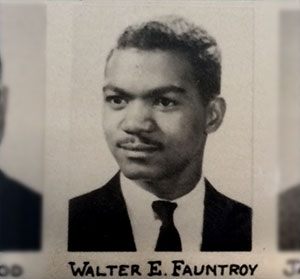His road to the front lines of the civil rights movement began with a late night discussion in a college dormitory room.
 Rev. Walter Fauntroy, ’58 B.D., played a behind-the-scenes but significant role in major civil rights events including the 1963 March on Washington, the Selma to Montgomery March of 1965, and the Meredith Mississippi Freedom March of 1966.
Rev. Walter Fauntroy, ’58 B.D., played a behind-the-scenes but significant role in major civil rights events including the 1963 March on Washington, the Selma to Montgomery March of 1965, and the Meredith Mississippi Freedom March of 1966.
The seeds of this involvement had been planted years before, on the night in 1951 when he met “Martin”—Martin Luther King, Jr.
The encounter took place during Fauntroy’s first year of study at Virginia Union University. King was traveling to Boston to begin his doctoral studies and Fauntroy, who was director of the freshman dormitory, was instructed by an upperclassmen to make a room available for King.
In an oral history interview, Fauntroy recalled that night.
“We stayed up all night talking about what we wanted to do with our lives,” Fauntroy said. “He amazed me with talk about nonviolence … I was fascinated by that.”
Fauntroy, now 82 and retired, is one of many YDS alumni to play direct and indirect parts in Selma, now in the public eye again thanks to its 50th anniversary this month and the new movie about the historic march.
After Virginia Union University, Fauntroy began his studies at Yale to prepare for the ministry. There, he heard once again of King, now a rising force within the growing civil rights movement.
“I saw him on television my first year at Yale Divinity School,” Fauntroy said. He recognized many of King’s themes, particularly his emphasis on nonviolence, from the conversation they shared some years before.
Read more alumni stories of the civil rights movement and share your own. |
After divinity school, Fauntroy returned home to take the pastorate of his childhood church home in Washington D.C., New Bethel Baptist Church.
Not long after, King and Fauntroy crossed paths again. In 1960 Fauntroy contacted King in hopes of cooperating in some capacity with the Southern Christian Leadership Conference. The next year, King selected Fauntroy as the regional representative for the SCLC. In 1964, he was named director of the organization’s newly formed D.C. bureau, a role that made Fauntroy King’s spokesperson on Capitol Hill.
Fauntroy had aspired to pursue a career in the ministry since his early teens. But as Fauntroy describes it, King’s influence led him to the realization that his role as a minister carried with it a political and social charge.
“We began to focus on the role of spiritual leadership, not to be taillights but to be headlights,” Fauntroy said. “Not to be, as he (King) put it, thermometers that measured the temperature but thermostats that set the temperate. That eventually led to my decision to become involved in politics.”
A D.C. native, Fauntroy had the knowledge of the local political scene to become a key asset to King in the region. Prior to the March on Washington for Jobs and Freedom in 1963, Fauntroy helped coordinate the facilities and logistics necessary to make the march a success.
Fauntroy collaborated with King again on the Selma to Montgomery in March 1965. Fauntroy helped to organize the third of the marches, the one that succeeded after the first two attempts were cut short by violence.
Such violence, Fauntroy said, was an attempt to deny protesters access to the American political process. It was that political process to which Fauntroy would remain committed over the years that followed. In 1971, he became D.C.’s first delegate to the U.S. House of Representatives in 100 years. He was D.C.’s delegate until 1990 and was a founding member of the Congressional Black Caucus.
Despite his long political career, he remained pastor of New Bethel until 2009.
His record of civil rights work also quickly caught the attention of Yale University, which awarded Fauntroy an honorary doctorate in 1969.
Through all of his career, Fauntroy describes himself as seeking to continue the work to which King was committed.
“As a faithful disciple of his (King’s), I worked with my brothers and sisters all over the country and around the world,” Fauntroy reflected, “to pass some good news to people who have inadequate income, education, health care, housing, and justice.”
Caleb Bedillion is a second year M.A.R. student studying religious ethics. After his time at YDS, he plans to continue a career in journalism.